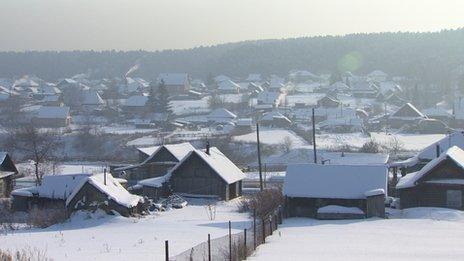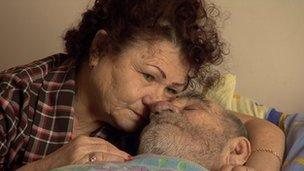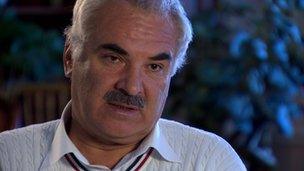Anger over corruption in Russian city of Novosibirsk
- Published

Russia's presidential elections are two weeks away. It looks as though Prime Minister Vladimir Putin will return to the top job, but with a substantial reduction in support.
Parts of Russia, including many of the big cities, have turned against Mr Putin's United Russia which opponents have nicknamed the "party of crooks and thieves".
Novosibirsk, Russia's third-largest city, returned one of the lowest votes for United Russia in December's parliamentary elections.
The ruling party was beaten into second place by the Communists in every district of the city.
As in many places in Russia, the big issue in Novosibirsk is corruption, which now affects much of people's lives.
They have stopped just blaming local officials who are stealing from them, and they have started blaming Moscow - and even the man at the centre of Russia's unusual political system, Vladimir Putin.
'Threatened'
The money-grab by some officials seems to be shameless. In the Novosibirsk region even veterans of the "Great Patriotic War" - as World War II is called in Russia - have been targeted.
The veterans are hugely revered in the country, and in the last few years there has been a scheme to provide the few surviving soldiers from the war with new housing. But some officials appear to have seen it as a way of making money.

Ivan Uvarov, who received a grant for war veterans, was persuaded to accept a tiny one-room house
Ivan Uvarov is from Maslyanino, a small town some 200km (120 miles) from Novosibirsk.
During the war he was an engineer, and walked all the way to Berlin, accompanying infantry as they fought their way to the German capital.
Under the veterans' housing scheme he qualified for a grant of 5m roubles - more than $150,000 (£96,000). He was entitled to choose his new home, and dreamed of buying a traditional wooden Siberian house in his village.
But some local officials persuaded him to accept a tiny one-room flat, in a block built for veterans out of bricks from a factory owned by one of the officials. Anti-corruption campaigners believe the flat was worth half of the 5m roubles Ivan Uvarov had been awarded. No-one knows where the rest of the money went.
To make matters worse, the officials also cajoled him into signing a clause saying the flat should return to the state after he died, and it took a protracted legal battle to reverse that.
We found Ivan Uvarov, and his terminally-ill wife sleeping in the small room they shared with their elderly daughter Lubov Uvarova, who had become their full-time carer.
There was just one room. It was the living room and bedroom for all three of them. The only other rooms in the flat were a bathroom and a tiny kitchen, and many of the flat's facilities are faulty.
Lubov Uvarova agreed to talk to us, but she was very careful. All she said was: "No-one asked him what he wanted. They just gave him this. And everything keeps breaking."
A soon as we left Maslyanino, local officials asked Lubov Uvarova to retract everything she said to us, though she would not.
Then her daughter was taken to the local police station and threatened. She was told she might lose her job. Still the family insisted that we should tell their story.
'Like fascism'
Just days later, Ivan Uvarov and his wife died of illness and old age, within a few hours of each other.
Vladimir Kirillov is one of the campaigners who worked with the family.
"Corruption in Russia is like fascism," he said. "When they are stealing from war veterans it really is fascism. But sometimes even fascists treated people like people, while these officials have no boundaries."
Attempts to make contact with the Administration of the Maslyanino Region to ask why war veterans were not given the housing they had a right to were unsuccessful.
But it is not only the poor who suffer from the rampant corruption.
Nikolay Olkhovsky is a senior executive in a cable-laying company, and lives in a luxury flat in Novosibirsk itself. He seemed to be living a comfortable life separated from many of the difficulties of life in Russia.
Then on the 4 September 2010 his son Oleg Olkhovsky was arrested. He was accused of dealing in drugs.
A trained engineer with a good job and a wealthy family, he had no reason to be involved in Novosibirsk's drug trade. The family are sure the drugs were planted in Oleg's car after he was arrested.
No-one could understand why the police would want to target Oleg. Then the requests for bribes started coming in.
Three days after his arrest someone telephoned Nikolay suggesting that he should pay 1m roubles ($30,000) and his son would be freed.
'No control'

Nikolay Olkhovsky says he never expected his son, Oleg, to be targeted
Three months later, the price went up to 2.5m roubles. Then it became 15m roubles ($500,000.) The family refused to pay. Oleg Olkhovsky is still in prison awaiting trial. He has been there for a year and a half.
Nikolay Olkhovsky now finds himself unexpectedly on the frontline of corruption in Russia.
"I get the impression that nobody cares about people," he said. "They only think about themselves. It never even occurred to me that someone would try get to me through my son."
Olga Safronova has been helping Nikolay Olkhovsky, and is head of a local anti-corruption committee.
"Vladimir Putin has been an important person for Russia," she said. "But I don't think that he should be running for president again. He has been in government for 12 years. So why does corruption still exist? There is just no control."
"The first four years he spent developing the country. But the next four years he spent more time on his public image, and the last four years he has only been working for himself. Now the wind of change is blowing."
Vladimir Putin is very likely to be elected president again on 4 March, but in Novosibirsk many people have had enough, and are preparing to punish him at the polls.